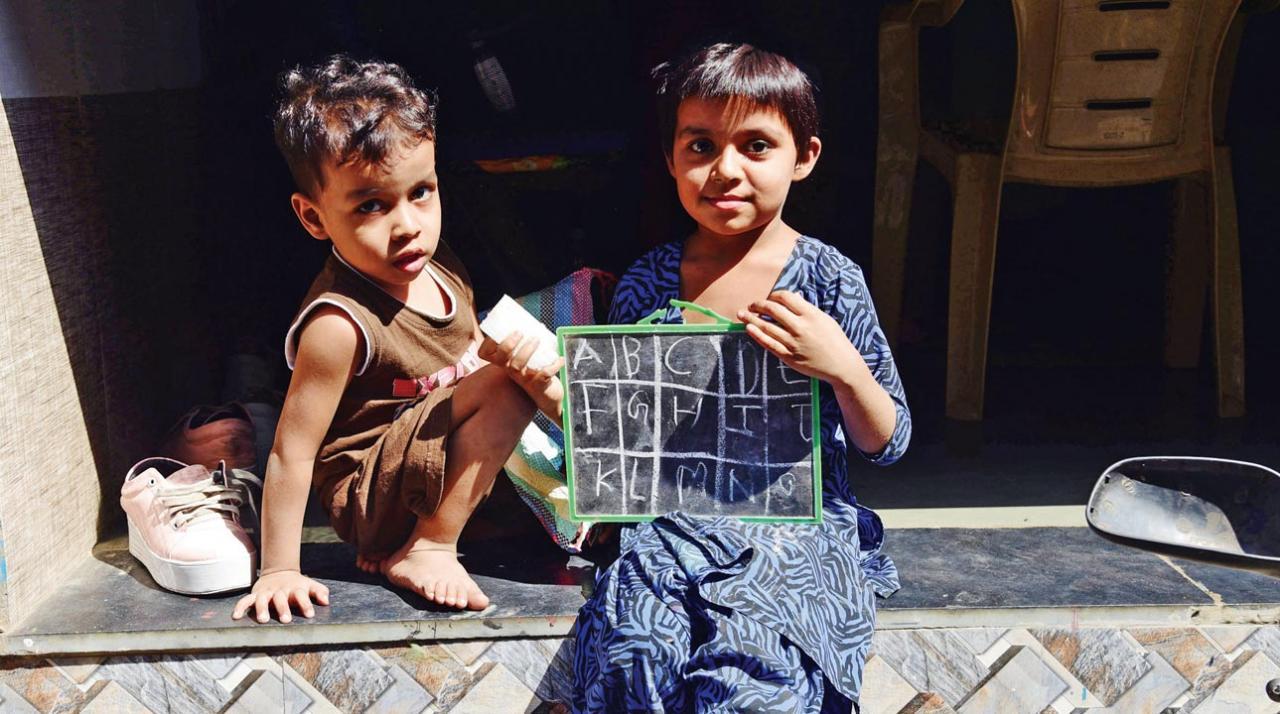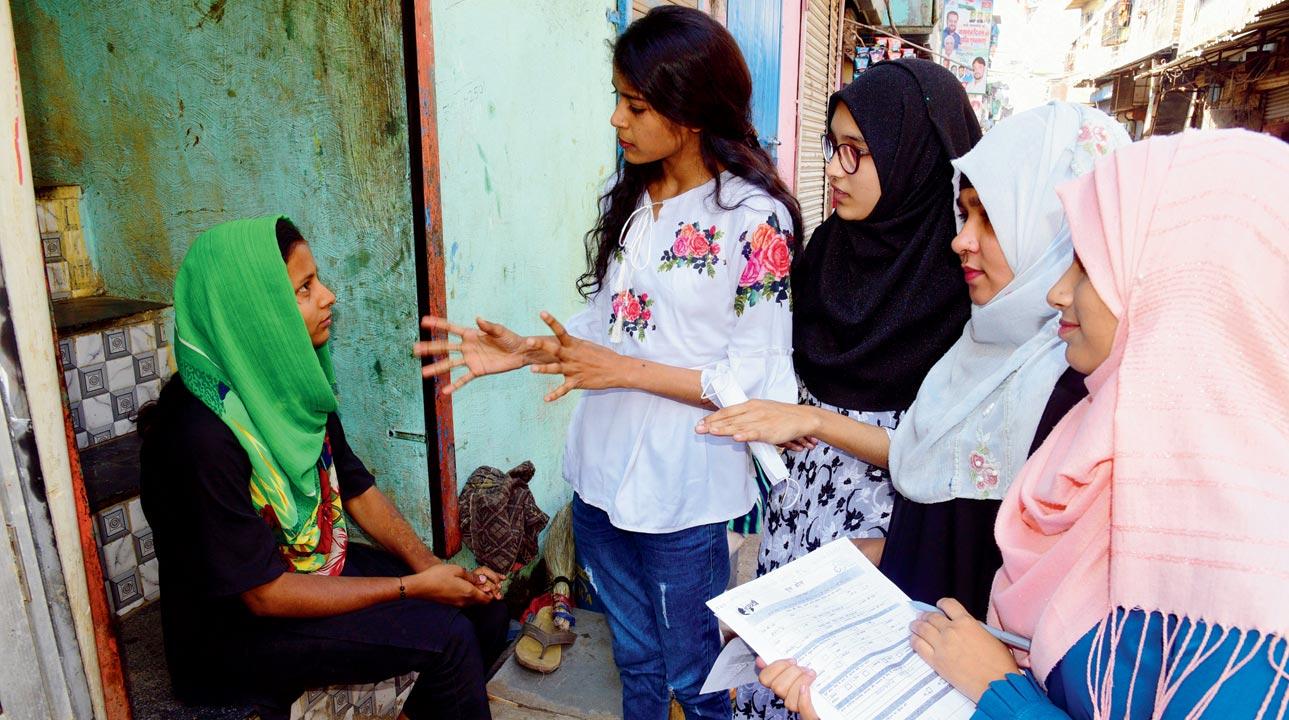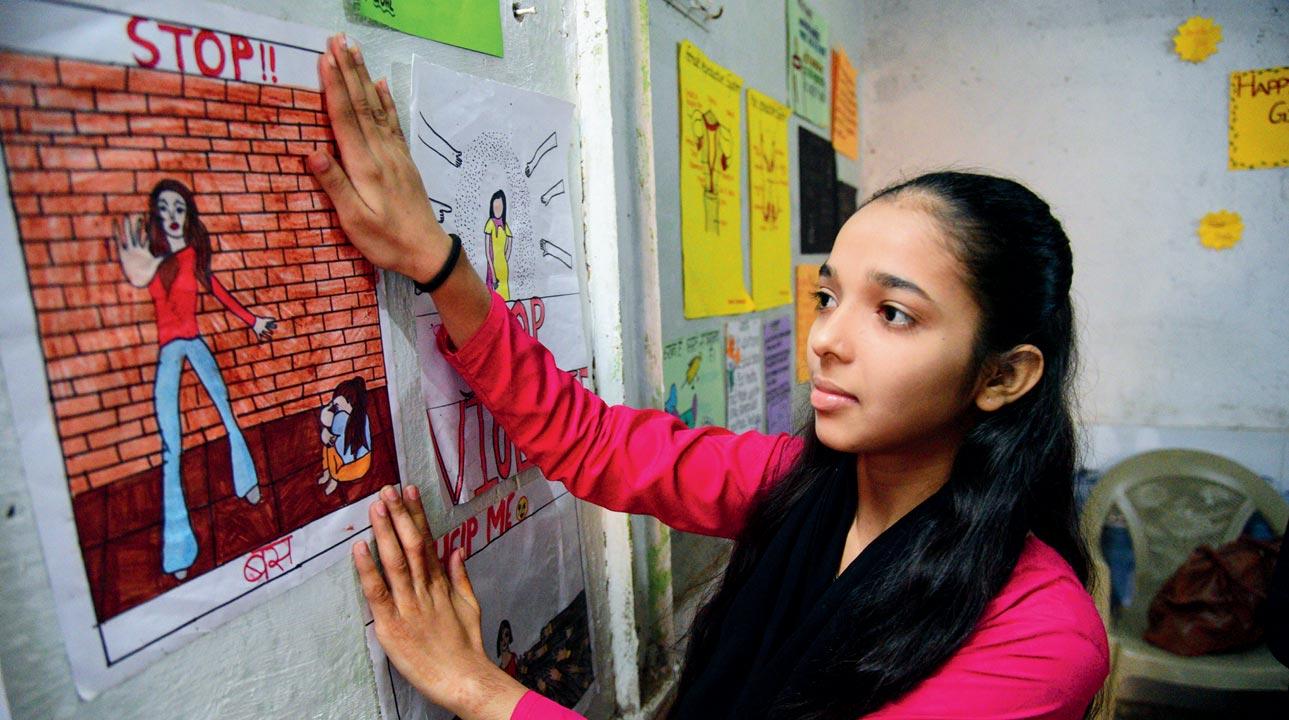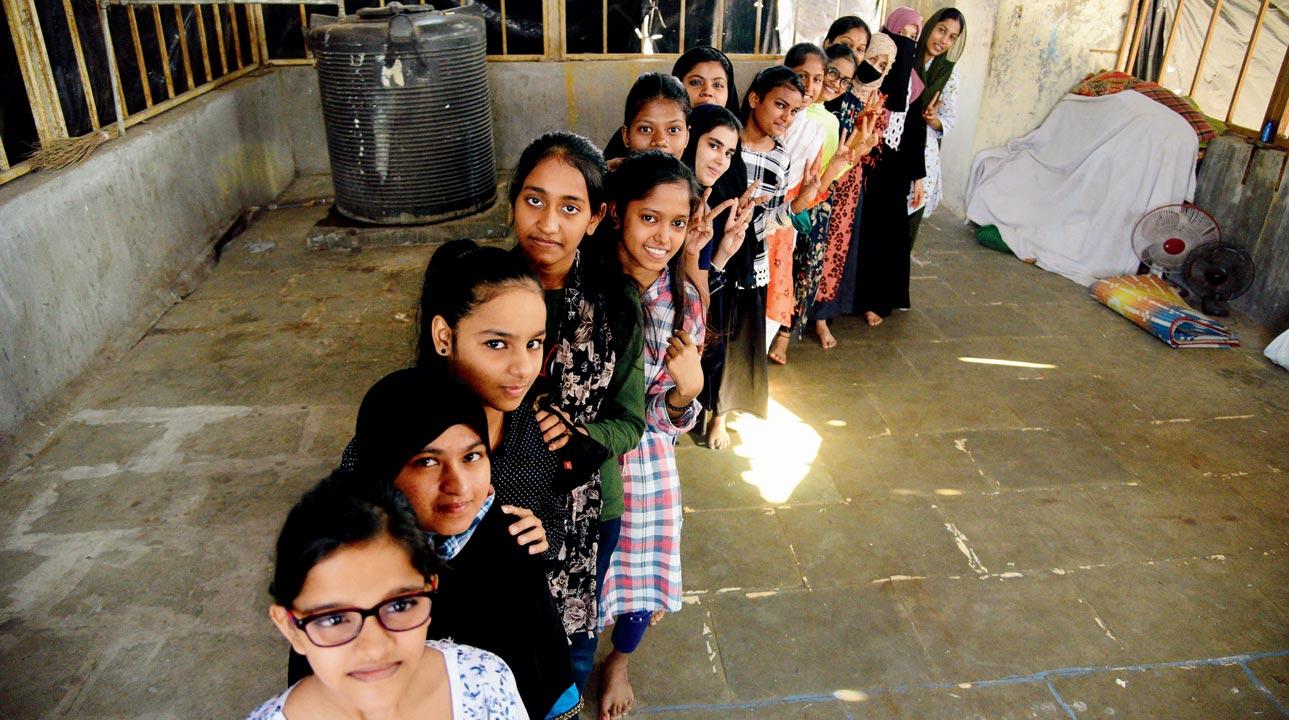A Mumbai non-profit and American NGO are behind a lockdown initiative in three of the city’s slum settlements where young girls are investigating what’s stopping them from living a full life, and finding tools to make a change

Pukar, along with Rise Up, a global US-based NGO, has co-opted adolescent girls between 15 and 18 from Mandala in Mankhurd. Pics/Pradeep Dhivar
In Mandala, a slum settlement in Mankhurd, education is luxury. Ironically, young girls here say that their female relatives in the villages are probably better off. “At least they get a free bicycle [given by state authorities] to go to school daily,” one of them says, when we meet them on a weekday afternoon. For nearly a year now, this room has become their refuge. After school classes moved online in 2020 and academics took a beating, many parents saw marriage as the next best option to secure the future of their daughters. Girls who had barely completed Class XII were becoming young brides. It was a chain reaction of sorts, they tell us.
ADVERTISEMENT
In June last year, NGO PUKAR took 60 of them under its wing. Seven months on, the girls are spearheading a campaign to address the lack of access to education for young women in the area. The initiative is part of a joint effort with Rise Up, a global US-based NGO that activates girls and women to transform their lives. It’s not just Mandala where the seeds of change are being sown. PUKAR has co-opted adolescent girls between 15 and 18 from Dharavi and Sewri’s Kuala Bunder too.
 Alefiya, pursuing her first year D.Pharm from Thakur College, Kandivli, seen leading a survey on the lack of access to education to girls, in the slum settlement of Mandala
Alefiya, pursuing her first year D.Pharm from Thakur College, Kandivli, seen leading a survey on the lack of access to education to girls, in the slum settlement of Mandala
The areas of Matang Rishi Nagar, Indira Nagar and Janata Nagar that make up Mandala, are situated in Mumbai’s M-East ward, which has the lowest human development index (HDI) in the city. Eighty two per cent of the residents here live in informal settlements and are primarily from the Dalit, Adivasi and Muslim migrant backgrounds. They earn an average income of Rs 10,000 per month, and their life expectancy is lower than their village counterparts, according to research by PUKAR.
The NGO, which previously equipped girls from the area with knowledge about menstruation, health and hygiene as part of its Journey Towards Dignity initiative, inducted many of them for the Rise Up programme that kick-started last year. The girls would meet every weekend for sessions that were designed to encourage “curiosity, listening, articulating and problem solving”. “We nudged them to think about the different issues affecting the community, and the patriarchal pressures stacked against them because of their gender,” says Neelima Ambekar, associate programme director, Youth Fellowship, PUKAR.

Sabiya, a Class X student, who resides in Kuala Bunder, Sewri, has already begun making posters, as part of the drive to tackle sexual harassment. Girls from the area will also be performing street plays in the neighbourhood
During these discussions, the most critical problem to crop up was girls dropping out early from school. “In the last couple of years, we have seen so many of our friends here drop out after Class VIII or IX. The mentality is such that even girls don’t feel the need to study. They’d rather be housewives and wash utensils,” says Alefiya, pursuing her first year D.Pharm from Thakur College, Kandivli. Another teen, Mamta, a Class XI Science student, who has two younger brothers at home, says the reason why most girls in Mandala lack aspiration is because they are never encouraged to pursue a career, or think beyond marriage. “Education is always treated as secondary, and something that is to be done for the heck of it. Many of us don’t even bother dreaming of a future.” The situation is different for male children. “Most parents would rather spend their meagre savings on educating boys.”
As part of the initiative, the students were expected to undertake a door-to-door survey of all the young girls in the area. To start with, they received training in research skills and framing of questions that would lead to data on topics they’d like to investigate, in order to implement interventions. “They were also taught how to interact confidently with the different stakeholders involved, including the parents and the girls,” says Ambekar.
 Girls from Dharavi say they faced a lot of resistance from locals, while conducting the door-to-door survey
Girls from Dharavi say they faced a lot of resistance from locals, while conducting the door-to-door survey
The team, over a period of three days, interviewed 145 girls from the community who had left school at an early age. “We were split into groups of two or three, and made to visit homes that we had identified and shortlisted for the survey. Sometimes, parents were forthcoming and allowed us to question their daughters, but many were also hesitant, and often shut the door on us. But, we didn’t give up,” adds Alefiya. From the survey they learnt that 97 per cent of girls from the homes surveyed had left school before Class X. While financial difficulties (31.2 per cent), lack of family support (20 per cent) and lack of interest (19.2 per cent) were cited as the main reasons for leaving school, early marriage, difficulty in studying, eve-teasing were among other factors listed by them. Fifty five per cent of these girls are now engaged in household work, even though six in 10 still hope they can continue their education.
For a metropolis like Mumbai where opportunities are not in lacking, the findings seem concern-worthy, but the PUKAR team says it’s a lot to do with the socio-economic demographic of the neighbourhood.
Ayesha, a Class X student, who wants to pursue medicine, says that ever since she joined the programme, she feels more confident. “One of my friends now wants to study like me, but her father doesn’t allow her to even leave home without male company. They’d rather that she learn the Quran. We hope all girls start thinking for themselves.”
The next course of action comprises intervention programmes. The girls will organise rallies in the neighbourhood to create awareness about the importance of education. Over the weekend, they will also begin rehearsing for a street-play, which will be performed in the market area. “Our parents are proud of what we are doing. They weren’t sure initially, but they realise that we really want to make is a difference to the lives of other girls,” adds Alefiya. Ambekar says that the survey has enabled them to conduct more targeted interventions. “Now that we know why girls are dropping out, it will be easier to address specific concerns. Because [our survey said] 60 per cent girls are still interested in studying, we are hoping to meet with their parents and see how we can help them pursue an education. If there’s a financial problem, we can even try and look for sponsorships.” Shubangi Gaikwad, coordinator, Rise Up, adds, “It’s good to see them stand up for causes that directly affect them. They know best how to make a change. All we are trying to do is give them a little push.”
Nearly 12 km from Mandala, in Dharavi, one of the densest slum pockets in the city, a similar movement is underway. But the resistance to it from locals is more pronounced. Vishaka, a Commerce student from SNDT University, says the neighbourhood is unsafe for women by evening. “There’s a Carrom Club in the neighbourhood, and all the men queue up outside to play. If we walk by, they pass comments about the way we look and dress, whistle at us. So, we should that route.” Some girls said that they don’t use the community toilets after dark; if they must, they go in pairs, because they fear harassment and molestation.
Alcoholism and drug abuse is common among the men, making young women feel unsafe. Samreen says that more often than not, they avoid telling their parents, because they fear they will restrict their freedom further, or not allow them to attend class or tuitions.
Having chosen to address sexual harassment in their neighbourhood, this group of girls were first taught what constitutes abuse and harassment, overcoming self-blame if an incident occurs, and how to reach out to the police to ensure that the perpetrator is booked. They were then trained to conduct the door-to-door survey, which they admit, didn’t go as planned. “We realised that the topic we had chosen was sensitive, but we had not anticipated the backlash from parents,” says Rupali, a Class XII student. “In fact, they cross-questioned us, and accused us of making money out of the campaign.”
The girls ended up interviewing 125 respondents in December 2021, of which 68 per cent were between the ages of 15 and 20, and 32 per cent in the 10-14 age group. Around 55 per cent of the respondents admitted that they had been sexually harassed in the area, which in turn affected them mentally. Some had begun to feel scared to travel alone. They felt a loss of confidence, and experienced depression, which affected their education and career choices.
While the girls in Dharavi will be performing a street play later this month to create awareness about the problem, those in Kuala Bunder, Sewri, have already begun making posters, as part of an awareness drive.
The area is a 60-year-old informal settlement located on the Bombay Port Trust land, and comprises mostly of migrants from Tamil Nadu, Uttar Pradesh and Bihar. Residents spend more than 20 per cent of their monthly income on accessing basic necessities like water and electricity. Shalini, a Class X student, shows us a map that she and her friends have made, which charts out spots where sexual harassment is rampant. “A lot of girls have dropped out of school because of abuse,” she admits. “Even when we conducted the survey, the girls were scared to speak up.”
Arvind Sakat, associate programme director, Rise Up, says, “The survey is only one part of the programme. When we started out, the main aim was to enable the girls to identify the challenges they face, and give them the tools to find solutions for it on their own. We hope to create changemakers from among them, who will work towards building a more equitable world.”
All the girls featured in this article have requested to be identified only by their first names
1 of 3
Girls facing sexual harassment in Kuala Bandar, Sewri
3 per cent
Girls from 145 respondents in Mandala, who continued their education after Class X
55 per cent
Girls from 125 respondents in Dharavi, who said they have faced sexual harassment at some point
 Subscribe today by clicking the link and stay updated with the latest news!" Click here!
Subscribe today by clicking the link and stay updated with the latest news!" Click here!







